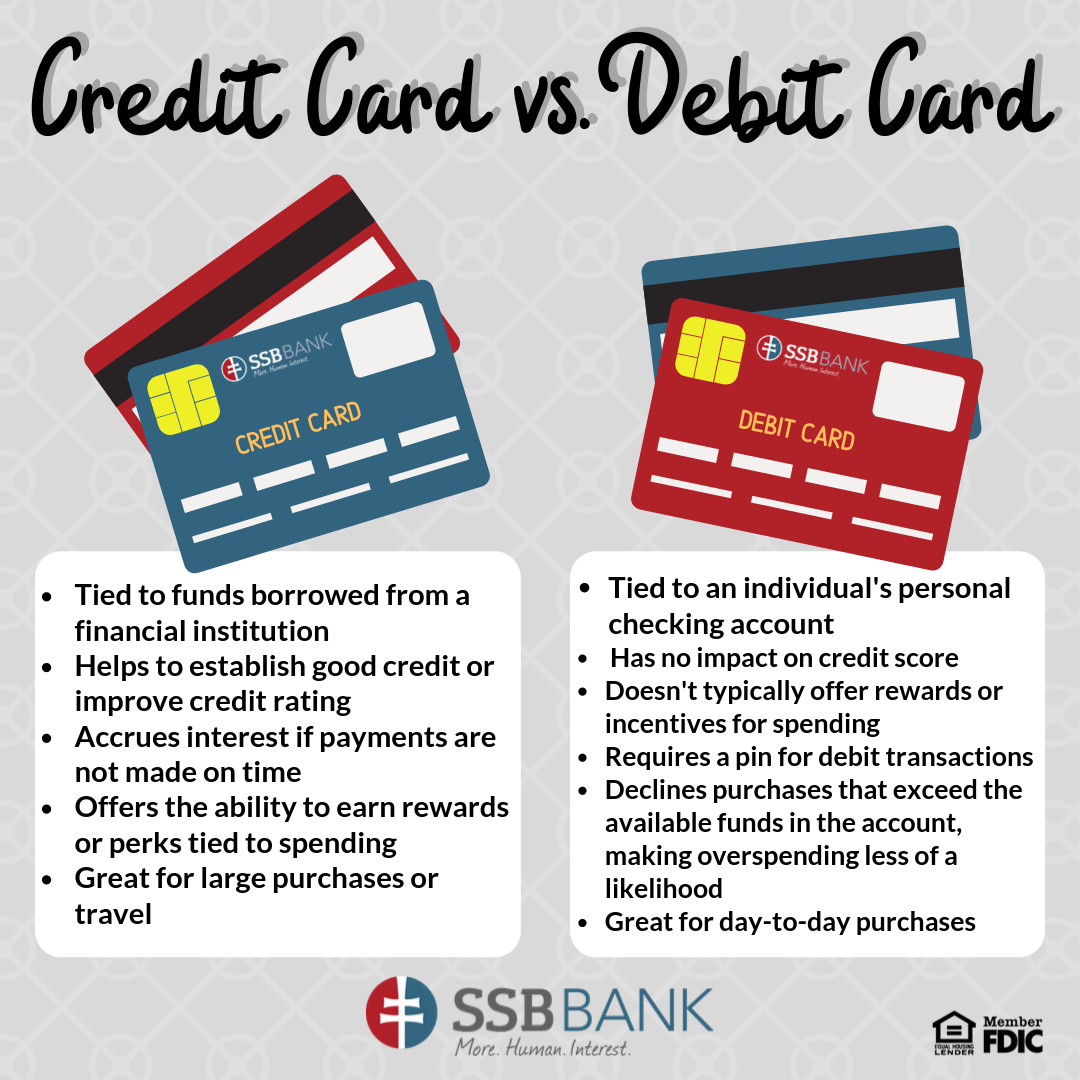What is the Difference Between a Credit Card and a Debit Card?

Credit vs. debit is an age-old debate. Which is better? Do I need both? You may wonder if there are advantages to one over the other, or on a more basic level, what the biggest differences are between the two. There are definitely unique advantages (and some downfalls) to both types of plastic that may come into play depending on your financial situation and your spending habits. We're here to spell out the differences and help to educate you on the basics of the two financial products.
The Basics: FAQs About Credit Cards vs. Debit Cards
The look and the function of credit and debit cards are almost identical. From “swiping” or inserting your chip card to the number of digits (16 to be exact) you’ll find on the face of the card; you can see how similar they truly are. More than that, both cards also free up space in your wallet by giving you the option to leave checks and cash at home. Although they may look and function as if they are one in the same, there are very clear and distinct differences between the two. The most prominent difference between a credit card and a debit card is the funds associated with the account.
Are my debit card and credit card connected to the same account?
 With a credit card, you are using borrowed money from a financial institution or bank with the understanding that you will pay back the money that you borrowed. Most often, that borrowed money will also come with an added cost known as "interest" which can be characterized as "paying" for the ability to utilize borrowed funds for an extended period of time. The money you are utilizing to make your purchases is drawn from a credit line with an approved limit based on your credit history, providing a cap of what can be spent.
With a credit card, you are using borrowed money from a financial institution or bank with the understanding that you will pay back the money that you borrowed. Most often, that borrowed money will also come with an added cost known as "interest" which can be characterized as "paying" for the ability to utilize borrowed funds for an extended period of time. The money you are utilizing to make your purchases is drawn from a credit line with an approved limit based on your credit history, providing a cap of what can be spent.
With a debit card, you are simply tapping into your own personal funds to make purchases. Those funds are connected to some type of checking account or savings account (either free or interest-bearing) at a preferred financial institution, making your money easily accessible, safe and in some cases, more profitable if it sits in an account where it accrues interest. When you use it, the money is immediately transferred out of your account to fund the purchases you are making.
What happens when I swipe my debit card vs. my credit card?
Because your debit card is connected directly to your checking account, when you use it, the money is immediately transferred out of your account. Essentially you are paying for the purchases immediately, as the money is leaving your account to fund the purchase. Rather than receiving a monthly bill, you will receive a statement (paper statement or e-statement depending on your preference) that outlines your transaction history for the previous month including debits and credits, as well as your account balance and additional fees or charges to your account.
With a credit card, you are making purchases using borrowed money, so when you swipe your card the money is taken from your credit line. Your monthly purchases are tabulated and then at the end of your billing cycle, you will receive a bill that outlines what you owe your lender. You are required to make on-time payments to avoid late fees and interest charges. If you make consistent and timely payments over a period of time, this will improve your credit score or in some cases, establish a credit history for you.
Is it more beneficial to use a credit card or a debit card?
The benefits associated with credit cards and debit cards differ depending on your individual financial situation. For example, if you are someone that has a tendency to overspend, the opportunity to receive points, miles or cash back don’t outweigh the possibility of damaging your credit history and ultimately racking up credit card debt on things you don’t need with money you don’t “technically” have. This is where debit cards outweigh the use of a credit card for certain consumers.
On the other hand, if you know that you have the means to support your spending on a credit card by paying your balance in full each month, it might be well worth it to utilize a credit card to earn miles on those dollars you would be spending anyway. Many credit card companies offer reward programs that help the consumer accumulate travel miles, provide cash back, or take advantage concierge services to help you buy tickets or make reservations.
Are there certain situations where a credit card is better than a debit card?
Credit is great for buying things you don't want to pay for up-front or all at once, and can often be used for rewards or cash-back. Many people prefer credit cards for large purchases they want to pay off little-by-little, unexpected expenses, or to get rewards on daily purchases. Additionally, if you are in a situation where you need to establish credit or you’re looking to improve your credit score, using a credit card and making on-time payments month-to-month could benefit you in both of those situations.
Credit cards are also great for large purchases or booking travel plans. When it comes to large purchases, most companies will offer 0% financing for a certain period of time, allowing you to make payments to pay off the merchandise before getting hit with additional interest. It also provides you the opportunity to spread out a pretty substantial one time payment into smaller, more manageable payments over an extended period. The key, though, is to budget accordingly to pay off the purchase while receiving the financing offer. Similarly, when booking hotels or travel accommodations credit cards can be more preferable (and are sometimes required by companies) over debit cards. Many travel related accommodations require a card that can be charged following a rental or stay in the case of damages or additional charges. Credit cards are great for this, allowing you to avoid an unplanned hit to your checking account.
If I pick the “credit” option when I use my debit card, does it make it a credit card?
After swiping or inserting your credit card when making a purchase, you are typically prompted to choose “debit” or “credit” for your transaction. Let’s set the record straight, though: choosing “credit” won’t make your debit card act like a credit card. It will still pull from your checking account funds; it just changes the route the merchant takes to process the payment. Additionally, credit transactions typically take a few days to clear, whereas debit transactions hit your checking account immediately.
Know your Options
Thankfully for us, we provide credit cards and debit cards to our customers. Just like our many other products, we can guide you on the advantages and disadvantages of both based on your individual needs. Regardless, we challenge you to research both options, and understand your spending habits and financial situation. You want to utilize a tool that will help you, not hinder you, financially.


More Articles Like This
Setting and Keeping Financial Goals
10/19/2021Regardless of what stage of life you are in, keeping an eye on your financial goals is critical to your financial health and stability. Here are our tips to help you establish, evaluate, and pursue your financial goals. If you are married, make sure you and your spouse are on the same page. It will...
Do You Need an Emergency Fund AND Rainy Day Savings?
8/18/2021Surprise! - An unexpected expense has popped up out of nowhere. You may have gotten a flat tire. Your home has suffered water damage and needs to be repaired. Or maybe you're facing an illness that has put you out of work. These are things no one wants to plan for, but everyone should!Unfortunately,...
Vacationing on a Budget
5/12/2021Summertime... The time of the year when many of us take the opportunity to get away for a vacation. In fact, according to AAA, "almost 100 million Americans, or 4 in 10 U.S. adults, will take a family trip in 2019."Whether you are traveling near or far, solo or with a group, there is a lot involved...

